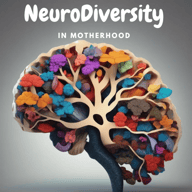Tackling Automatic Negative Thoughts (ANTS) A Guide for Moms of Neurodivergent Kids

Mothers wear many hats, juggling family life, work, and personal self-care responsibilities. Raising neurodivergent children can bring unique joys and challenges, often leading to a mix of emotions that can shape our mental landscape. One of the subtle but damaging forces that many mothers face is Automatic Negative Thoughts (ANTS). Understanding these thoughts and their impact on our emotional well-being is crucial for us and our children.
Automatic Negative Thoughts are those seemingly spontaneous, negative thoughts that creep into our minds without conscious effort. For example, moments of self-doubt, such as "I'm not doing enough for my child" or "I'm failing as a parent," are common ANTS that can plague mothers. These thoughts often emerge from a place of concern for our children's well-being, reflecting the weight of our responsibilities and the societal pressures we face. However, while it's natural to worry about our children, allowing these thoughts to take root can lead to emotional distress.
The brain's neural networks play a significant role in this process. When we repeatedly engage in negative thinking, we strengthen the neural pathways associated with those thoughts. This results in a vicious cycle where negativity becomes our default response, making it increasingly challenging to react positively to life's hurdles. This can lead to increased anxiety and feelings of inadequacy, impacting our overall well-being.
Amid the daily demands of parenting, it's essential to acknowledge the presence of ANTS without judgment. Awareness is the first step toward breaking the cycle. Incorporating mindfulness techniques into your routine can help shift your focus from negative spirals to positive affirmations. For instance, instead of thinking, "I'm not equipped to handle this," try reframing it to, "I'm doing my best, and that's enough."
Creating a supportive environment is equally vital. Seek connections with other mothers who understand the joys and challenges of raising neurodivergent children. Sharing experiences and strategies can foster resilience and reduce feelings of isolation. Additionally, engaging in self-care practices—whether through physical activity, journaling, or simply taking moments for quiet reflection can bolster your mental health.
In conclusion, recognizing the impact of Automatic Negative Thoughts is crucial for your emotional well-being as a mother. You can cultivate a healthier mindset by understanding how these thoughts work and actively working to reframe them. This benefits you and creates a more favourable environment for your neurodivergent child, allowing you to flourish together on this journey. Remember, you are not alone, and prioritizing your mental health can empower you as a mother.
